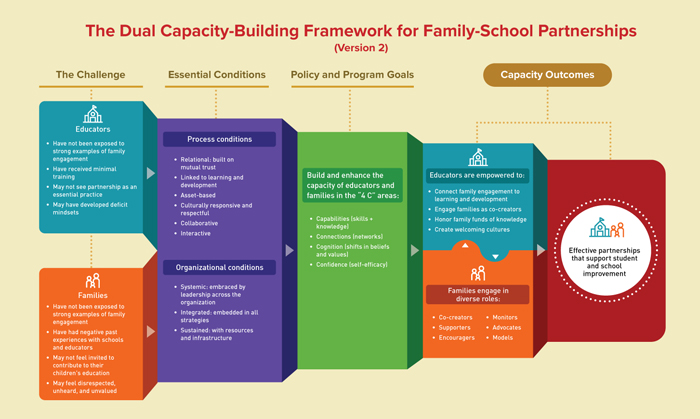
A Framework for School-Family Partnerships
By Meredith Ayala | January 2025

Family partnerships aren’t just a significant part of student success – they are essential. But how do we create collaborations authentically, encompassing the strengths, resources and assets of our school, families and community? How can we be sure we are honoring all of our families, meeting them where they are, and partnering with them to support all students’ development?
The Dual Capacity-Building Framework for Family-School Partnerships, created by Karen Mapp, Ph.D., offers a tool for educators, policy makers, families and community members to understand how to cultivate and sustain partnerships that support student achievement and school improvement. This research-based framework advances a simple yet instrumental premise: effective partnerships between home, community and school can only develop and thrive if both families and school staff have the requisite capacity to engage in partnership.
Let’s take a closer look (click the image to view a larger version).

Mapp, K. L. & Bergman, E. (2019). Dual capacity-building framework for family-school partnerships (Version 2). Retrieved from: www.dualcapacity.org
The framework is designed as a compass to guide the development of family engagement strategies, policies and programs. It includes:
Do we genuinely value our families as our students’ first teachers, create opportunities to learn from them and recognize the assets they bring to a partnership? Or have we developed a deficit mindset when we consider students’ families? If educators lack strong examples of family engagement or didn’t receive adequate and meaningful training, they can encounter challenges. By using the framework to uncover these roadblocks, we can create judgment-free spaces to address them and develop ways to move forward.
The framework also highlights challenges our families may face with engaging in their children’s education and partnering with educators. Inviting families to join us at the table isn’t enough – unless they feel valued and a sense of belonging, they may not speak up.
It’s important to view our families as equal contributors and partners in supporting their children’s academic, career and social/emotional success. As school counselors, we have the opportunity to not only listen, respect and value our families but to model these practices for other educators and uplift all that our families bring to the table in support of student and school success.
Family–school partnerships must be systemic, integrated and sustained. The organizational conditions refer to how our districts, schools and educational programs are organized to support strong family–school–community partnerships. As school leaders, school counselors have the privilege and power to influence the strategic goals of not only their school counseling program but also their school.
For example, what role do families have in supporting on-time graduation, positive behaviors and a sense of belonging at school? An integral one. Family engagement should be a priority, embedded into structures and processes such as training, curriculum, teaching and learning. In other words, it should be integrated into the school’s daily operations.
Cross-cultural networks and relationships built on mutual trust enhance connections across the school community and also increase the self-assurance and self-confidence of both families and educators to partner, leading to shifts in their values and beliefs.
When I partnered with my student’s families, together we built a strong foundation, similar to the base of a cheerleading pyramid, and together we watched their children soar.
School counselors are essential in leading, advocating and collaborating to promote equity and access for all students and families. Once I learned about the Dual Capacity-Building Framework, family engagement made even more sense. Learn more about the framework at dualcapacity.org.
Meredith Ayala is manager of Grants and Program Development with Educate Fairfax in Falls Church, Va. Previously, she was a family partnerships specialist for Fairfax County Public Schools.
The Dual Capacity-Building Framework for Family-School Partnerships, created by Karen Mapp, Ph.D., offers a tool for educators, policy makers, families and community members to understand how to cultivate and sustain partnerships that support student achievement and school improvement. This research-based framework advances a simple yet instrumental premise: effective partnerships between home, community and school can only develop and thrive if both families and school staff have the requisite capacity to engage in partnership.
Let’s take a closer look (click the image to view a larger version).

Mapp, K. L. & Bergman, E. (2019). Dual capacity-building framework for family-school partnerships (Version 2). Retrieved from: www.dualcapacity.org
The framework is designed as a compass to guide the development of family engagement strategies, policies and programs. It includes:
- Challenges, describing capacity challenges to help us understand why educators and families have struggled to build trusting and effective partnerships
- Essential conditions integral to cultivate and sustain partnerships
- Policy and program goals and outcomes that emerge when the essential conditions are met
- Capacity outcomes for educators, community members and families leading to student and school improvement
Challenges
So why haven’t we been able to cultivate and sustain positive relationships with families, and what is the school counselor’s role in turning this around? First, we must understand and clearly articulate the challenges that get in the way. The framework prompts us to ask if we see partnership as an essential practice, woven throughout the school or simply a one-and-done event with a curriculum night.Do we genuinely value our families as our students’ first teachers, create opportunities to learn from them and recognize the assets they bring to a partnership? Or have we developed a deficit mindset when we consider students’ families? If educators lack strong examples of family engagement or didn’t receive adequate and meaningful training, they can encounter challenges. By using the framework to uncover these roadblocks, we can create judgment-free spaces to address them and develop ways to move forward.
The framework also highlights challenges our families may face with engaging in their children’s education and partnering with educators. Inviting families to join us at the table isn’t enough – unless they feel valued and a sense of belonging, they may not speak up.
It’s important to view our families as equal contributors and partners in supporting their children’s academic, career and social/emotional success. As school counselors, we have the opportunity to not only listen, respect and value our families but to model these practices for other educators and uplift all that our families bring to the table in support of student and school success.
Essential Conditions
The way forward starts with the essential conditions, the nuts and bolts of family engagement. The research-based framework outlines the foundational process conditions and organizational conditions required to cultivate and sustain family–school partnerships, and relational trust is intentionally placed at the top. School counselors play a critical role in creating relationships built on mutual trust and can do this by creating regular opportunities for educators and families to learn about one another through dialogue and collaboration. School counselors also lead the way with integrating academic connections into family programming and leadership development opportunities, which links family engagement to student learning and development. Processes must be asset-based, culturally responsive and respectful, collaborative and interactive. School counselors, who already approach their work through this lens, uplift the process conditions and create a school community where all students thrive.Family–school partnerships must be systemic, integrated and sustained. The organizational conditions refer to how our districts, schools and educational programs are organized to support strong family–school–community partnerships. As school leaders, school counselors have the privilege and power to influence the strategic goals of not only their school counseling program but also their school.
For example, what role do families have in supporting on-time graduation, positive behaviors and a sense of belonging at school? An integral one. Family engagement should be a priority, embedded into structures and processes such as training, curriculum, teaching and learning. In other words, it should be integrated into the school’s daily operations.
Policy and Program Goals
The policy and program goals inform a school’s capacity-building strategy for family engagement. When the essential conditions are met, educators and families experience greater capacity in their capabilities, connections, cognition and confidence – the four C’s. School counselors should continue to engage in professional development and encourage their school colleagues to do the same, increasing their skills and cultural competency, while also providing families with opportunities to enhance their understanding of school policies and culture.Cross-cultural networks and relationships built on mutual trust enhance connections across the school community and also increase the self-assurance and self-confidence of both families and educators to partner, leading to shifts in their values and beliefs.
When I partnered with my student’s families, together we built a strong foundation, similar to the base of a cheerleading pyramid, and together we watched their children soar.
Capacity Outcomes
With effective partnerships supporting student and school improvement, educators are empowered to connect family engagement to learning, engage families as co-creators, honor family funds of knowledge and create welcoming cultures. Take a moment to imagine such a school and picture the classrooms. We see families emerge as supporters, encouragers, monitors, advocates and, most important, equal partners and contributors to their children’s education. The reciprocal exchange speaks to the power of families and educators working together to support student and school improvement.School counselors are essential in leading, advocating and collaborating to promote equity and access for all students and families. Once I learned about the Dual Capacity-Building Framework, family engagement made even more sense. Learn more about the framework at dualcapacity.org.
Meredith Ayala is manager of Grants and Program Development with Educate Fairfax in Falls Church, Va. Previously, she was a family partnerships specialist for Fairfax County Public Schools.